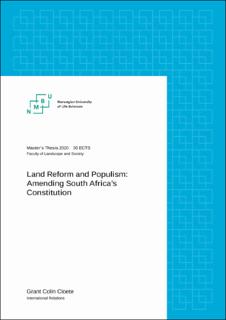Land reform and populism : amending South Africa's constitution
Abstract
Land reform is a highly contentious issue in post-apartheid South Africa. Immediately after apartheid ended, the new African National Congress (ANC) government, on advice from the World Bank, adopted a willing buyer-willing seller approach whereby the government would pay market prices for land purchased from white landowners and transfer it to black South Africans. Unfortunately, land reform has progressed at a snail’s pace due to a number of reasons including lack of political will, corruption, poor policy decisions and lack of implementation and diversion of the programme towards elites.
In 2018, the ANC decided to side with the populist Economic Freedom Fighters party (EFF) to pass a motion in parliament seeking to amend South Africa’s Constitution to allow for land expropriation without compensation, currently prohibited by section 25 of the Constitution. The EFF has long supported this change; however, the ANC had opposed it and long claimed that the Constitution does not prohibit effective land reform. So why did they all of a sudden change their position?
Using populism and party competition theory as a theoretical framework, this thesis concludes that ANC’s change of position is due to pressure from populist forces within South Africa and not because of an earnest desire to address the real challenges with land reform. The ANC, mindful of its failure on land and fearing a further loss of support to the EFF, thought it would be politically expedient to co-opt the EFF’s position on land. In addition to this, populist forces within the ANC have also pushed for this change to try and regain control over the party and by extension, the country.

